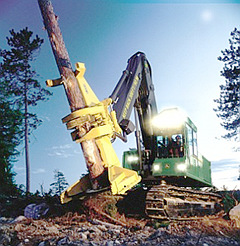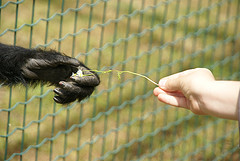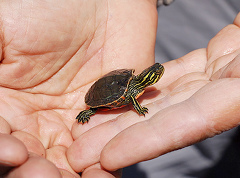(Versión en castellano en Ecosofia.org).
 The struggle between species on Earth is, for now, settled. In the quest for evolving new and better ways of surviving and replicating, we have found a powerful and general adaptation. Our brains are able of creating technology to manipulate matter, energy, and information, at a scale far beyond our physical limitations as primates. This adaptation puts us well above the other animals on Earth.
The struggle between species on Earth is, for now, settled. In the quest for evolving new and better ways of surviving and replicating, we have found a powerful and general adaptation. Our brains are able of creating technology to manipulate matter, energy, and information, at a scale far beyond our physical limitations as primates. This adaptation puts us well above the other animals on Earth.
We are a remarkable species that over a few hundred thousand years has been consolidating its position as the dominant species. We have become formidable predators, and while there are still many ways in which the rest of the terrestrial biota can kill us, we are able of sterilizing vast areas of the planet, leaving only the flora and fauna that fits our interests.
But the key to our success, our brain, is not only a tool of survival and replication. Our brain can do many other things that are well beyond the interest of our genes for multiplying themselves. A human can decide, against its reproductive drive, to take contraceptives. A human can decide, against energy efficiency considerations, to spend a great deal of his life creating music, poetry, dance.
 A human being may also decide to switch sides. Obviously a human can not stop being a human. But he can decide to advocate for non-human interests, for the interests of the other beings in our ecosphere. He can decide that he does not want its own species to continue growing and dominating the other species in the way they it has been doing it.
A human being may also decide to switch sides. Obviously a human can not stop being a human. But he can decide to advocate for non-human interests, for the interests of the other beings in our ecosphere. He can decide that he does not want its own species to continue growing and dominating the other species in the way they it has been doing it.
This is not something now. Throughout the years, there have always been people who, for various reasons, have decided to join the ranks of the weak. Human sexual dimorphism makes human females with less muscular mass, that have been forced by men to serve their interests. But some men helped the women break free. Also some groups of humans developed the socio-technical mechanisms to create powerful armies before other groups. Those who did have the weapons before, conquered the others. But some white men also helped black men to be free.
In the same way, a human being can decide to join the ranks of the defence of other species, and fight so that other humans curb their exploitation of Earth's resources. Those who decide to give this step will find loneliness and no applause. Those who decide to switch sides, should expect contempt from the other humans. Many of our older institutions are fundamentally enterprises of promotion of human interests, and hence their rejection of any effective way of self-limitation of the human population, and their rejection of any deeper concerns with non-human animals.
 Moreover, those who decide to fight for the non-human must understand that it is fundamentally different from protecting the ecosphere so that it can sustain human interests. Many of those who fight for the ecosphere as a resource for humans will simply never switch sides, but their power can also be used as a tool. Those who decide to switch sides and fight for non-human interests, must be willing to create alliances with them too, understanding clearly that while they are not in the same side, there are common interests.
Moreover, those who decide to fight for the non-human must understand that it is fundamentally different from protecting the ecosphere so that it can sustain human interests. Many of those who fight for the ecosphere as a resource for humans will simply never switch sides, but their power can also be used as a tool. Those who decide to switch sides and fight for non-human interests, must be willing to create alliances with them too, understanding clearly that while they are not in the same side, there are common interests.
Finally, those who decide to switch sides and fight for non-human interests must expel summarily from their ranks anyone who uses or is willing to use violence in this fight. Creating pain will not reduce pain. You do not take sides with the weak to destroy the strong. You take the side of the weak to find a balanced agreement of coexistence that is harmonious, sustainable, prosperous, and peaceful.
There is much to be said about this confrontation. Most will remain neutral. Those who want to fight, know where they are needed.
Photos: Salish Sea, Greekadman @ Flickr (CC).
(Versión en castellano en Ecosofia.org).